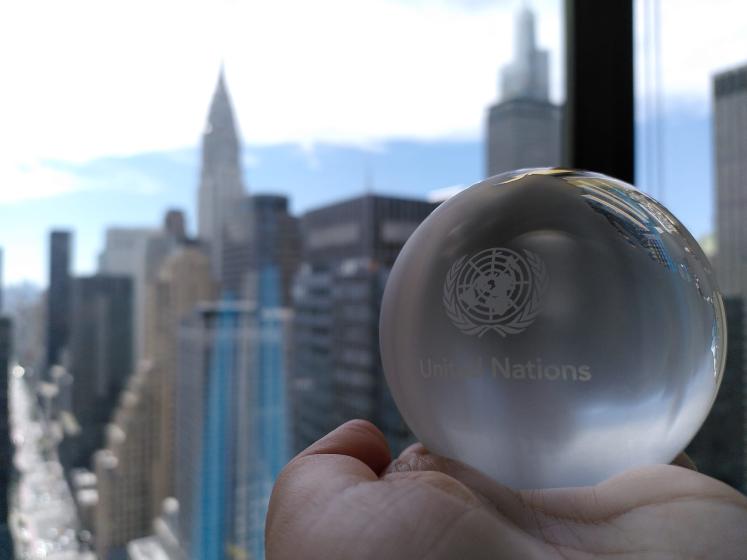The 2023 SDG Summit, held in conjunction with the UN General Assembly, served as an international review of progress and discussions on Agenda 2030. Representatives from member states, the UN, and civil society gathered to reaffirm their commitments to the SDGs and chart a way forward. Our colleagues, Professor Daniel Karthe, Head of Research Programme – Resource Nexus for Regions in Transformation, and Dr. Christina Froemder, Associate Programme Officer at UNU-FLORES, attended this event in New York to engage with global experts and leaders.
As part of the SDG Action Weekend, our UNU event centred on the role of postgraduate education in achieving the global goals. It took place in a hybrid format at UNU Centre for Policy Research (UNU-CPR) on September 16, 2023. The event explored international and transdisciplinary higher education initiatives in Bangladesh, Germany, and Japan. Experts from UNU and partner institutions discussed the potential of postgraduate education in addressing sustainable development challenges, particularly through collaborations between the Global North and the Global South. The event also facilitated the exchange of strategies and best practices for integrating environmental management and resource-nexus concepts into postgraduate curricula.
The side-event commenced with remarks from UNU Rector Tshilidzi Marwala, who emphasised the crucial role of higher education in sustainable development and UN University’s efforts to integrate education and capacity development through the Knowledge Academy for the Resource Nexus (KARE). Co-organizer André Lindner shared insights into higher education for sustainable development, highlighting the progress toward the seventeen SDGs (April 2023, Secretary General – Progress Report 2023 available here) and TU Dresden’s commitment to accelerate sustainable development through partnerships and knowledge sharing. He provided examples of successful programmes such as the Centre for International Postgraduate Studies of Environmental Management (CIPSEM) and the Global Water and Climate Adaptation Centre (ABCD), showcasing their impact on global sustainability.
A pre-recorded interview with Prof. Saleemul Huq**, Director of the International Centre for Climate Change and Development (ICCCAD) in Dhaka, Bangladesh, offered a perspective from the Global South. Prof. Huq highlighted Bangladesh’s vulnerability to climate change due to its geography, population size, and poverty. He praised Bangladesh’s proactive approach to adapting to climate change and its leadership in climate change adaptation, especially regarding cyclonic storms. Prof. Huq emphasised the importance of people-to-people exchanges between the Global North and South, particularly involving young people.
Prof. Daniel Karthe’s presentation introduced the “Resource Nexus for Sustainability Transformations” (NEXTRA) doctoral programme, accentuating the importance of collaboration between universities to improve research on sustainability issues and involve students in joint activities. The programme connects doctoral research with the work of the UN system, focusing on environmental resources and their interconnections to contribute to the SDGs. It also supports doctoral students from developing countries to empower them as future change agents.
Prof. Dr. Muhammad Fazli Ilahi, Vice Chancellor of Ahsanullah University of Science and Technology (AUST) in Dhaka, Bangladesh, discussed AUST’s contributions to the SDGs through sustainability-focused curricula and research programmes, emphasising international cooperation and SDG implementation – the most recent of which is the Chair for Sustainability and Textile Innovation, established in partnership with UNU-FLORES and TU Dresden.
Ralph Wollmann, representing the German Environment Agency (UBA), provided an overview of the agency’s approach to promoting sustainable development, highlighting international cooperation and the establishment of an international academy to address environmental and sustainability issues.
UNU-IAS and UNU-INWEH shared their initiatives to accelerate progress on the 2030 Agenda, stressing the importance of youth empowerment and international collaboration, while highlighting educational programmes and opportunities for researchers.
The discussions underscored the significance of interdisciplinary collaboration between the Global North and South. UNU’s unique position within the UN system, with its network of academic institutions and partners, enables it to advance global sustainability. Evidence-based policies, interdisciplinary approaches, and partnerships were noted as critical factors for sustainability transformation.
Lessons Learned from the SDG Action Weekend, UN Summit, and Beyond:
Key takeaways from the SDG Action Weekend and UN Summit underlined the need for a moonshot approach to achieve the SDGs, requiring cross-global partnerships and higher education programmes. Despite global challenges, including the slow progress on the SDGs, experts and leaders provided valuable insights and inspiration for meaningful action. The event concluded with an invitation for collaboration among sister institutes and individuals to contribute to a more sustainable world.
New York, as a hub of global activity, is increasingly embracing sustainability, with initiatives like the transformation of an old metro track into the “High Line,” creating an urban garden landscape that supports environmental preservation and social well-being.
The 2023 SDG Summit and SDG Action Weekend were impactful events that encapsulated the importance of collaboration, education, and sustainable development. Despite challenges and slow progress on the SDGs, these gatherings have provided valuable insights and inspiration for meaningful action. As we move forward, it’s worth mentioning that we can anticipate positive developments on the horizon.
In the coming weeks, we look forward to an upcoming report by Christian Schneider, a doctoral candidate, who will share valuable insights from the UN SDG Summit. This report promises to offer fresh perspectives and lessons that can further fuel our collective commitment to achieving the Global Goals.
With a shared sense of purpose and a commitment to making a positive impact, we can continue to work together to create a more sustainable and prosperous world. Let’s stay focused and act collectively for the betterment of our planet and future generations.
** Our Team was very saddened to hear of the recent passing of Prof Huq. On behalf of all of us at UNU-FLORES, we share our condolences with his family, and commit to carrying on his inspiring work to tackle climate change.
Our experience at the Summit was greatly enriched and inspired by the following contributors and speakers:
- Prof. Dr. Tshilidzi Marwala, Rector of United Nations University and UN Under-Secretary General, Tokyo, Japan [pre-recorded]
- Prof. Dr. Shinobu Yamaguchi, Director, United Nations University – Institute for the Advanced Study of Sustainability, Tokyo, Japan [in-person]
- Prof. Dr. Kaveh Madani, Director, United Nations University – Institute for Water, Environment and Health, Hamilton, Canada [in-person]
- Dr. André Lindner, Managing Director and Advisor Internationalization, School of Civil and Environmental Engineering, Dresden University of Technology, Germany [virtual]
- Prof. Dr. Saleemul Huq, Director, International Centre for Climate Change and Development, Dhaka, Bangladesh [pre-recorded]
- Prof. Dr. Daniel Karthe, Head of Programme, United Nations University – Institute for Integrated Management of Material Fluxes and of Resources, Dresden, Germany [in-person]
- Prof. Dr. Muhammad Fazli Ilahi, Vice Chancellor, Ahsanullah University of Science and Technology (AUST), Dhaka, Bangladesh [virtual]
- Ralph Wollmann, President Office of the Geman Environment Agency, focal point for the TES Academy, and CIPSEM steering committee member. [virtual]
- Dr. Christina Frömder, Associate Programme Officer, United Nations University – Institute for Integrated Management of Material Fluxes and of Resources, Dresden, Germany [in-person]
- Dr. Saroj Kumar Chapagain, Associate Programme Officer, United Nations University – Institute for Integrated Management of Material Fluxes and of Resources, Dresden, Germany [virtual]



